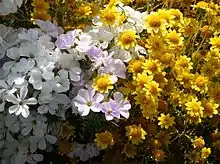Leptosiphon grandiflorus
Leptosiphon grandiflorus (syn. Linanthus grandiflorus) is a species of flowering plant in the phlox family known by the common names large-flower linanthus and large flowered leptosiphon.
| Leptosiphon grandiflorus | |
|---|---|
 | |
| with goldfields (Lasthenia californica) | |
| Scientific classification | |
| Kingdom: | Plantae |
| Clade: | Tracheophytes |
| Clade: | Angiosperms |
| Clade: | Eudicots |
| Clade: | Asterids |
| Order: | Ericales |
| Family: | Polemoniaceae |
| Genus: | Leptosiphon |
| Species: | L. grandiflorus |
| Binomial name | |
| Leptosiphon grandiflorus (Benth.) J.M. Porter & L.A. Johnson | |
| Synonyms | |
|
Linanthus grandiflorus | |
Distribution
It is endemic to California, where it is known from the California Coast Ranges of the Central Coast and the San Francisco Bay Area.[1] It grows below 1,200 metres (3,900 ft) in chaparral, coastal prairie, coastal sage scrub, closed-cone pine forest, grassland, and oak woodland habitats.[1]
It is California Department of Fish and Wildlife and IUCN listed Vulnerable species, and is on the California Native Plant Society Inventory of Rare and Endangered Plants.[2] Its current range is uncertain because many known occurrences of the plant have been extirpated.[2]
Description
Leptosiphon grandiflorus is an annual herb producing a hairy stem with occasional leaves which are each divided into linear lobes up to 3 centimeters long.
The inflorescence at the tip of the stem is a loose cluster of a few white or pinkish funnel-shaped flowers with lobes up to 1.5 centimeters long. The bloom period is April to July.
See also
- Flora of the California chaparral and woodlands